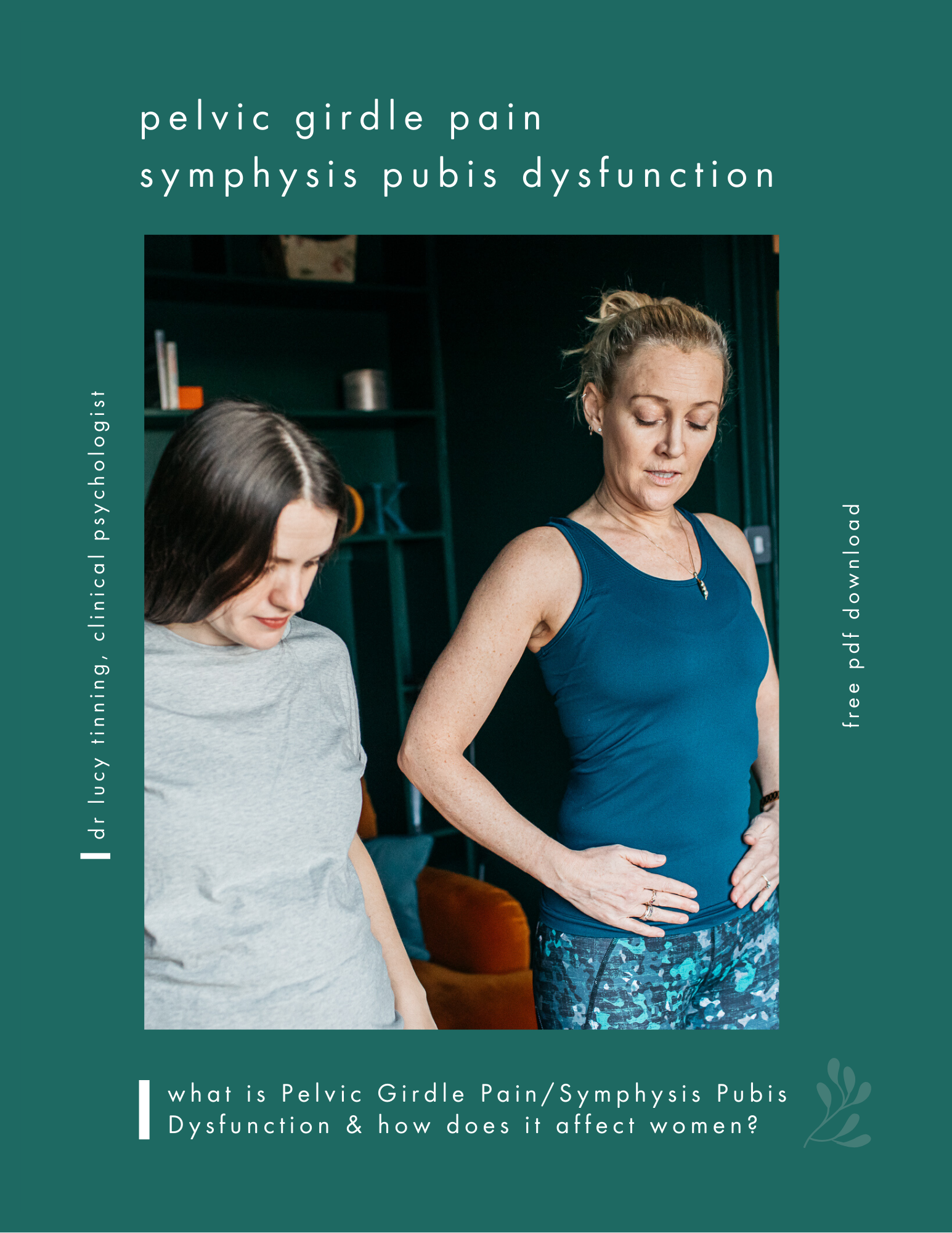Free Resources
for those suffering with Pelvic Girdle Pain (PGP) / Symphysis Pubis Dysfunction (SPD)
Using her background as a Clinical Psychologist and PGP sufferer, Dr. Lucy Tinning has worked really hard to create wealth of helpful and practical free resources to give you the tools you need to understand and manage Pelvic Girdle Pain aka Symphysis Pubis Dysfunction or Pelvic Instability.
There is very little awareness yet, up to 72% of sick leave in pregnancy is due to PGP. Women are suffering, the research is clear about this, yet there is a lack of effective options to manage their PGP available. Having suffered from PGP herself, Lucy knows how debilitating it can be. She also knows the barriers that PGP sufferers come up against when trying to communicate their experiences and their needs. No woman should have to go through this alone and Lucy has made it her mission to help women around the world feel heard, supported and begin their journey to managing their pain.
Amongst her resources is a link to her Facebook support group, an ‘Introduction To PGP’ pdf download, guided meditations, videos and print out worksheets. Please note that all of these are resources are copyright ©lucytinning and for personal use only. They may not be reproduced without permission.
If you are a therapist, practitioner or clinic owner interested in learning more about Pelvic Girdle Pain - please get in touch.

This guide is for anyone who is suffering with pelvic pain in pregnancy specifically Pelvic Girdle Pain (PGP)or Symphysis Pubis Dysfunction (SPD).
PGP and SPD are the same conditions. Pelvic pain in pregnancy was originally called Symphysis Pubis Dysfunction (SPD) but health professionals now call it Pelvic Girdle Pain (PGP) because it affects all the joints of the pelvis, not just the Symphysis Pubis - the area at the front of the pelvis.
Sign up below to receive ‘What is PGP & how does it affect women’ FREE pdf download. By signing up you’ll also be added to my newsletter and will receive news on latest blog posts, PGP advice and events.
p.s once you sign up you’ll receive an email asking you to confirm before you will be added to the list. If you can’t see this email, please check your junk folder and add us to your contacts.

This Facebook group has been set up by Dr. Lucy Tinning as a support network for women suffering with pelvic girdle pain (pgp) / symphysis pubis dysfunction (spd)
This is an amazing community of women who are at all stages of their PGP journey. Whether you’re expecting or are a new mama, you’re more than welcome!

I have written some tips for coping with a COVID-19 lockdown, which you can download and reference by clicking the button below. I do hope they’re helpful to you and that you and your family are safe and well.

Join Lucy for a special PGP Pain Relief masterclass from the comfort of your own home. This is an opportunity to understand more about Pelvic Girdle Pain/Symphysis Pubis Dysfunction/Pelvic Instability and to learn some easy tools to help you manage your pain.
The next masterclass date announced soon!
Sign up below to join the waiting list and book your space.
“Not only is Lucy extremely knowledgeable about PGP, but she’s also been through it, which gives her that extra level of empathy. Her PGP masterclass has made me look at mindfulness in a completely different way. I now have a whole list of things I do to help my pain, which I picked up from Lucy.” - A happy Masterclass attendee

Available for a ‘pay-what-you-can’ donation basis using the button below.
A digital mini-course by clinical psychologist and Pelvic Girdle Pain (PGP) and Symphysis Pubis Dysfunction (SPD) sufferer, Dr. Lucy Tinning, to help with understanding and coping with PGP/SPD.
“This course made me think differently. It prompts you to look at your situation and your relationship with PGP and the pain you are experiencing. I admit I cried, but in a good way! I felt more empowered as a result.” — Karen
I aim to make my resources as accessible as possible to everyone, so if you are currently in financial hardship, please do download this course by selecting the lowest donation option I have available, of £5. Thank you!
Available for a ‘pay-what-you-can’ donation basis
This is a really helpful and practical session for women facing a diagnosis or feeling in crisis about their PGP symptoms. During the session, Lucy will ask about your particular experience of PGP and guide you to formulate a plan for managing your symptoms

I have written an article all about understanding and managing Pelvic Girdle Pain, free for you to download below. I do hope you find this helpful and insightful.
These recordings, which include a relaxing Body Scan exercise, a Yoga Nidra practice and a Guided Meditation are aimed at relaxing tension in your muscles and calming your nervous system. This is crucial because pain is stressful for our nervous system and if we have additional stress from our daily lives as well (as many of us do) it can feel more overwhelming which leads to even more pain.
When you have any kind of ongoing pain, it is important to practice these pain relieving exercises as frequently as possible. The more you practice the more you are able to build new neural pathways in your brain and body that mean you are able to achieve a state of relaxation and less pain more quickly.
For mums with PGP, this is also useful during labour, to encourage your body to remain in a state of calm during the birth. This promotes more oxytocin in your system which is what you need. It is also very important postnatally to take time to relax and to be able to access this state as you transition into motherhood, which brings with it many new experiences which can be challenging and stressful.

For women with pelvic girdle pain: Here you will find the PGQ because it is important that you know there is a way of practitioners assessing and diagnosing PGP. Not all practitioners may not that this measure exists. It may help you to be informed about this questionnaire when you are seeking support from your doctor, midwife, physiotherapist, osteopath or chiropractor, for example.
For Practitioners working with patients with pelvic girdle pain: This questionnaire was developed to help you assess women that present with symptoms of pelvic girdle pain.
The PGQ is a specific measure that assesses activity limitations and symptoms in people with pelvic girdle pain. It was developed for people with pelvic girdle pain during pregnancy as well as postpartum and can be used in research and clinical practice.
The PGQ is a self-report questionnaire of 20 activity items and 5 symptom items scored on a 4-point response scale. Each question is scored from 'Not at all' (0) to 'To a large extent' (3). Questions on the activity sub-scale range from difficulty with dressing, climbing stairs, doing housework, rolling in bed to pushing a shopping cart.
Item scores are summed and transformed to yield a score of 0 to 100, where 100 is the worst possible score.
There is limited evidence for the measurement properties of instruments commonly used for women with pelvic girdle pain. The PGQ is the first condition-specific measure developed for people with PGP. The PGQ had acceptably high reliability and validity in people with PGP both during pregnancy and postpartum, it is simple to administer.
Open Access Article: The pelvic girdle questionnaire: a condition-specific instrument for assessing activity limitations and symptoms in people with pelvic girdle pain
“Lucy’s resources had me hooked from the get go. I loved the mix of videos, presentations and worksheets. I wasn’t just given valuable information but tools in which I could use there and then, to take and improve the quality of my life. This is conscious living, it’s the inner work everyone talks about but doesn’t know where to start and personal development all rolled into one. It’s so clever and yet so simple. I’ve not seen anything like this ever. In my opinion, every woman could use this not just for PGP but for every kind of pain. It really is genius and I can not wait for this course to be rolled out and available to all pregnant women with pgp and women in general”
You can also check out lucy’s IGTV channel which has some helpful videos and Q&As around PGP